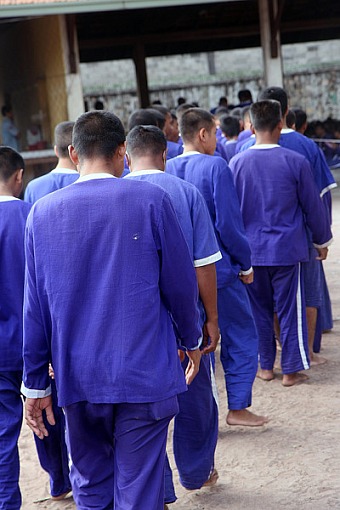Draft Prison Law A Good Start, but National Assembly Must Address Flaws
Published on 19 October 2011A draft prison law which is set to go before the National Assembly is a positive step for Cambodia's prison system, but falls short of fully protecting prisoners' rights in several key respects.
The draft law's shortcomings are detailed in a new briefing paper from the Cambodian League for the Promotion and Defense of Human Rights (LICADHO). The paper also highlights a handful of the law's positive provisions.
One of the more alarming provisions in the law, Article 71, authorizes the use of prison labor for private enterprise. Both Cambodian and international law forbid the use of prison labor for the benefit of private individuals in most circumstances.
The inclusion of this provision comes as a surprise, considering the government's acknowledgement - and condemnation - last month that Cambodia's prisons previously harbored garment factories. The factories were suspected of selling clothing to international buyers. Speaking at a conference of international clothing buyers in Phnom Penh this summer, Minister of Commerce Cham Prasidh was quoted in the Cambodia Daily as saying that prison garment production was "already of the past. It is no more."
"The inclusion of this provision is unfathomable," said LICADHO Director Naly Pilorge. "It is true that prisoners desperately need work opportunities, but allowing private companies to exploit them is not the way forward. These companies are not interested in prisoners' rehabilitation; they're only interested in padding their profits with cheap, non-union labor."
LICADHO found that vagueness is a problem in many areas of the draft. The law makes broad pronouncements in areas such as sanitation, prison discipline, cell space and recreation, but fails in multiple instances to provide benchmarks or minimum standards in these areas. Instead, the law states only that conditions must be "adequate." It also fails to provide sufficient protective mechanisms in areas such as prison discipline and prison grievances.
"Although some of these areas could be fleshed out with prakas or sub-decrees, primary prison legislation must contain key minimum standards," said Am Sam Ath, LICADHO's monitoring supervisor. "There's no rush to pass this law. The National Assembly should take their time and do it right."
The law also does little or nothing to address core problems which have been well-documented for over a decade, such as requiring prison visitors to pay bribes and the rampant commodification of basic prison amenities, from clean water to sleeping space.
LICADHO believes that the law should be amended to explicitly forbid payments for visiting privileges and basic prison amenities.
Other problematic provisions include:
- Article 41, which states that children cannot stay with their mothers in prison past the age of three. Currently, children are allowed to stay until age six.
- Article 49, which sets inadequate restrictions on the use of force.
- Article 52, which requires a minimum 14 days of "isolation" for any repeat disciplinary offense, even minor offenses
- Article 56, which discriminates against foreign prisoners by requiring their friends and relatives to go through the prisoner's embassy in order to visit; this is particularly problematic for prisoners whose countries are not represented in Cambodia.
- Article 59, which requires official visitors, including prison monitoring organizations, to keep information gained from prison visits "confidential." This appears to be an attempt to limit the dissemination of bad publicity about the prison system.
The law does contain some positive points, however, which if properly enforced would protect prisoners' rights and facilitate a more professional prison system.
Article 81, for example, prohibits torture or the use of cruel treatment and references the possibility of criminal prosecution under the Penal Code. Article 83, meanwhile, makes it a crime for prison staff to unlawfully refuse to release a prisoner or to extend a prisoner's sentence. This practice is common in some Cambodian prisons, and is usually used as a way to extort money from prisoners prior to their release.
Other articles forbid the use of corporal punishment, the placement of prisoners in dark cells, and the practice of using prisoners to enforce discipline against other prisoners.
"The draft law is an important step toward establishing a more human and more professional prison system in Cambodia, but it's not quite there yet," said Ham Sunrith, LICADHO's Deputy Director for Monitoring and Protection. "It's up to the National Assembly to finish the job."
For more information, please contact:
▪ Naly Pilorge, Director, LICADHO - 012-803-650
▪ Ham Sunrith, Deputy Director for Protection and Monitoring, LICADHO - 012-988-959
▪ Am Sam Ath, Monitoring Supervisor, LICADHO - 012-327-770
PDF: Download full statement in English - Download full statement in Khmer








